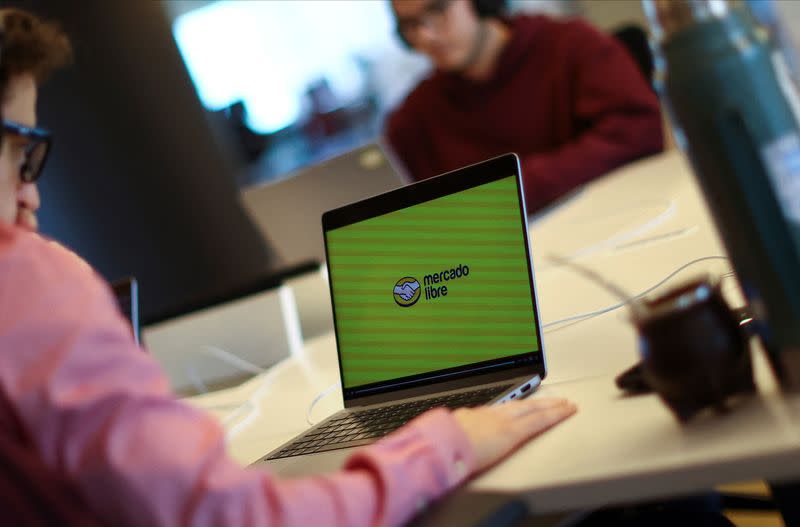MercadoLibre, Latam's Amazon.com rival, rides high with AI, loans, drones

By Lucinda Elliott and Kylie Madry
BUENOS AIRES/MEXICO CITY (Reuters) - When Wagner Dias and his wife Mariana needed a loan to grow their children's clothes business, the Brazilian entrepreneurs turned to Argentina's MercadoLibre Inc, the online platform they use to sell their products.
MercadoLibre, which is making a push into an increasingly crowded regional fintech and credit market, already had the data it needed to green-light the loan. The Amazon.com of Latin America has used innovations like that to cement its status as the region's most valuable firm with a market capitalization exceeding $100 billion.
"Because they had access to all my app history as a seller and buyer, there was no red tape. The money was deposited instantly," said Dias, who borrowed in total some $30,000 to build the couple's business in Sao Paulo.
"I can ask for credit with one click," said Dias, explaining that the first $11,000 tranche of the loan had boosted sales by 40% within six months.
MercadoLibre, which has overtaken Brazilian state energy giant Petrobras this year as Latin America's most valuable company, is finding new ways to serve Dias and others in its online "ecosystem" to lock in shoppers and sellers. Its new offerings, ranging from credit to movies, have helped fuel its rapid expansion.
The company is growing digital advertising revenues toward $1 billion this year with tie-ups for content with firms like Disney. It has added distribution centers to support sellers, and is using artificial intelligence to boost its loan business and streamline administrative costs.
"We believe that we have a tremendous competitive advantage in the fact that we have an ecosystem," the firm's CEO Marcos Galperin told Reuters in an interview in Buenos Aires, adding that the financing and commerce business spurred each other.
"When you have more financing, e-commerce grows. And vice versa."
MercadoLibre is the dominant e-commerce player in Latin America, weathering aggressive pushes by Amazon and others. But on fintech it still lags behind pure digital finance rivals such as Brazil's Nubank or Argentina's Uala. It wants to replicate the crossover success of Chinese online marketplace Alibaba, whose Alipay wallet is among the top players in the world's second largest economy.
Galperin said growth of the fintech business was strong considering the tough regional competition. Fintech revenues increased nearly a third over the last year, second quarter data showed, though it declined slightly as a percentage of overall sales. Its credit unit grew at a faster rate, near 50%.
Galperin said MercadoLibre wanted to be a major option for Latin Americans as they rapidly shift away from cash as the traditional form of payment and savings.
"Basically the idea is to give each user a private banker of their own," he said. He downplayed concerns some analysts have expressed about non-performing loans, saying the plethora of data the firm had on its users reduced that risk.
"We use artificial intelligence, we use machine learning, we have a lot of information between MercadoLibre and Mercado Pago that we can use... We have so much information on these people that we feel very comfortable providing them loans."
BUYING NEW SHOES, WHAT ABOUT A LOAN?
Investors are bullish on the company's outlook. The stock is currently at $2,100, and in September, Morgan Stanley hiked its target price on the shares to $2,500 from $2,175. Also in September, JPMorgan signed a $250 million financing deal to expand MercadoLibre's fintech business in Mexico.
Growing use of smartphones in Latin America is opening up online saving and spending options to millions in a region where around a quarter of the population has little or no access to bank accounts or relies solely on cash.
"We're really just scratching the surface of all that we can do," said Galperin, explaining that e-commerce and digital payment use was far higher in Asia, Europe and North America. He was targeting tripling active users to 300 million.
But MercadoLibre faces strong competition from regional fintech rivals like Nubank or Uala, which secured a banking license last year in Mexico and is also using AI to aid credit scoring systems, a company spokesperson said.
"It's still smaller than large competitors, but it has been calling attention in the space," said Maria Clara Infantozzi at Itau bank in Sao Paulo.
Argentine confectionary business owner Silvina Riveros was growing tired of traditional banks but opted to get a loan from Uala to buy appliances "mainly due to the cheaper commissions for the service and the speed of crediting money into your account," she said.
"I've given up on high street banks, there's too much paperwork and bureaucracy."
MercadoLibre's potential ace card, however, remains its mix of commerce and finance. The firm is boosting areas like food, apparel, beauty and electronics, and has opened more warehousing and distribution centers to speed up delivery.
It is also experimenting with an electric delivery fleet and drones to get goods to hard-to-reach consumers in isolated areas of Brazil. While drone technology remained niche, Galperin said "those geographies happen quite a bit in Latin America."
Meanwhile, millions of customers like 24-year-old Irlanda Zermeno from Mexico City, are taking out smaller loans from the platform to help them buy more products at check out.
Zermeno told Reuters she was shopping on the MercadoLibre app for a pair of new shoes, when a message popped up offering her credit to make the purchase in installments.
"I didn't look for (a credit line), they suddenly just asked me: do you want one?" said Zermeno, who works in public relations. "Ever since then I use it frequently. If you pay back on time, the credit amount you can take goes up."
(Reporting by Lucinda Elliott in Buenos Aires. Additional reporting by Kylie Madry in Mexico City and Andre Romani Pinto in Sao Paulo. Editing by Adam Jourdan and David Gregorio)